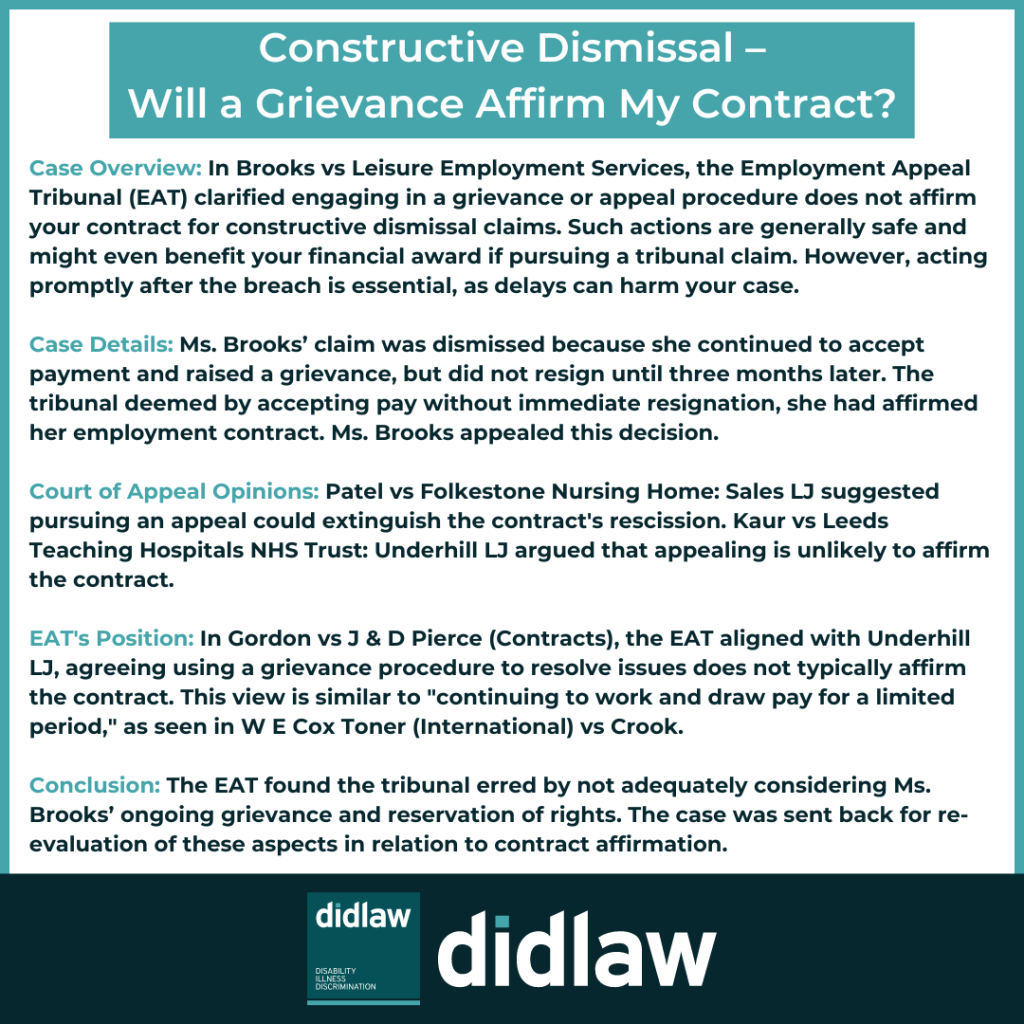
Not usually, no, said the Employment Appeal Tribunal in Brooks v Leisure Employment Services Ltd.
Why does it matter? It matters in the context of constructive dismissal. If you are alleging that you had no option but to resign your contract because your employer acted so egregiously as to make the ongoing contract impossible you have to be careful that you do not take any steps that will affirm – or evidence that you intend to continue under the contract. With any claim of constructive dismissal the best advice is to take legal advice before you decide to go down this path. People routinely talk about it and consider it as an option when dealing with employment issues but it is not an easy road or one to be embarked on lightly.
The Employment Appeal Tribunal (EAT) has confirmed that engaging in a contractual grievance or appeal procedure is not likely to unequivocally affirm the employment contract for the purposes of a constructive dismissal claim. You should therefore be safe to engage in a grievance – it may also impact your financial award in the tribunal if you do not – and it is recommended that you do. It is however important that you act swiftly in relation to the triggering event for constructive dismissal because a time delay can also be fatal.
An employment tribunal dismissed Ms Brooks’ constructive dismissal claim on the basis that she had affirmed her employment contract by continuing to accept payment without resigning for three months following her employer’s repudiatory breach. She had raised a grievance about the breach, which was not completed at the time she resigned, and had expressly reserved her rights. Ms Brooks appealed.
Previously, there was an apparent conflict between two Court of Appeal authorities: the comments of Sales LJ in Patel v Folkestone Nursing Home Ltd [2018] EWCA Civ 1689, that successful pursuit of an appeal extinguishes the rescission of the employment contract, and those of Underhill LJ in Kaur v Leeds Teaching Hospitals NHS Trust [2018] EWCA Civ 978, that exercising a right of appeal is not likely to be treated as an unequivocal affirmation of the contract.
Subsequently, in Gordon v J & D Pierce (Contracts) Ltd UKEATS/0010/20, the EAT, on an obiter basis, had preferred Underhill LJ’s position in Kaur.
The EAT agreed that Kaur is authority for the proposition that the exercise of a contractual grievance or appeal procedure in an attempt to give an employer an opportunity to resolve the issues that give rise to the breach of contract is not likely to be treated as an unequivocal affirmation of the contract. In the EAT’s view, use of a contractual grievance procedure will generally be no more than “continuing to work and draw pay for a limited period of time” (emphasis added), as referred to in W E Cox Toner (International) Ltd v Crook [1981] IRLR 443, so generally will not amount to affirmation. The EAT considered that Patel is not about affirmation of a contract but about the consequences of succeeding in an appeal in a case of ordinary dismissal, and so is not in conflict with Kaur.
The EAT held that the tribunal had failed to take Ms Brooks’ ongoing grievance and reservation of her rights into account and it was vital for it to do so when considering affirmation, so remitted the case to the same tribunal to consider this issue.
This blog was written by Karen Jackson, MD/Founder of didlaw.
